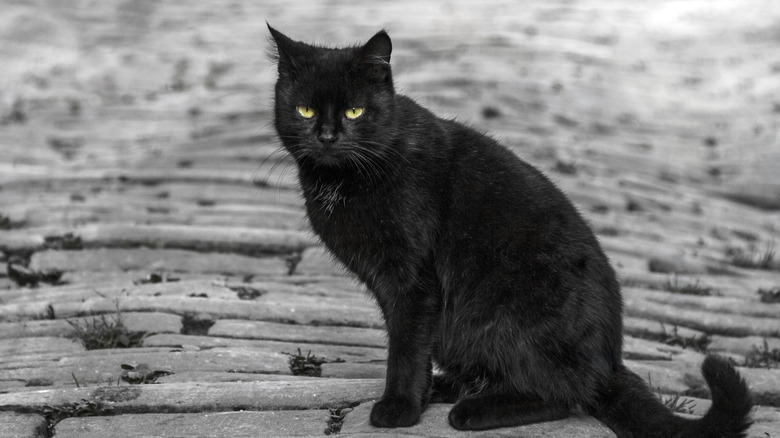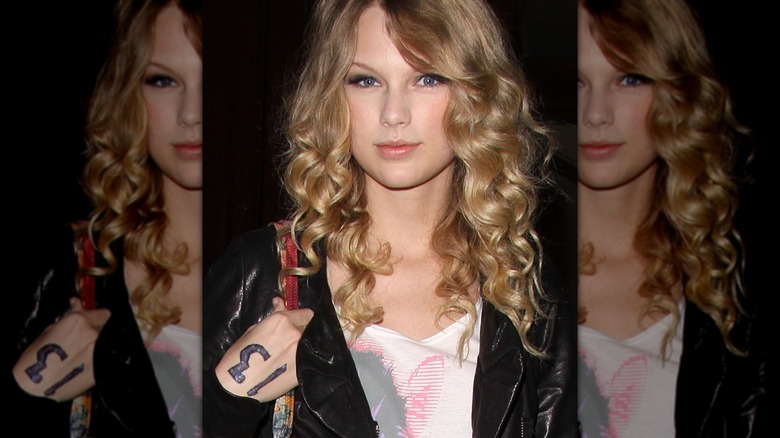Musicians Who Are Notoriously Superstitious
Everyone has their quirks, and for some, those include holding bizarre superstitions or repeating sometimes unique rituals in the belief that it can forestall disaster or improve their luck. Even famous musicians aren't above having a special pre-show observance, having a lucky number, or an unshakable superstitious belief. While many musicians perform small rituals before they go on stage to help ensure a good show, there are some that take it to the extreme.
Keith Richards, lead guitarist for the Rolling Stones, has a specific meal he eats before a performance. Pop star Taylor Swift believes the number 13 has specific significance. For rapper Missy Elliott, a black cat crossing her path is enough to send her back home for the day. But it's not just modern musicians who have these weird quirks. The late 19th-century composer and conductor Gustav Mahler was obsessed with a curse related to his predecessors, including Ludwig van Beethoven.
A rockstar's weird pre-show ritual
Many musicians have pre-show rituals they swear by, whether it's Robert Plant's unusual requirement of herbal tea and clothes ironing, yes, ironing, or Chris Martin of Coldplay having to brush his teeth before performing, but there are some musicians who take it to even weirder heights. The Rolling Stones were infamous for their backstage antics, partying, and drug use, but for Keith Richards, at some point, his pre-show ritual took a culinary curveball. It seems to have begun on the Rolling Stones' 1989 Steel Wheels world tour, during which the guitarist insisted management include a replica English pub at each of the concert's stops and that they serve shepherd's pie.
Richards was so serious about getting to dig into the pie first that he held up a Toronto concert during the tour after discovering some of the crew had gotten to the dish before him and wouldn't go on stage until the staff made a new one. "It's now famous, my rule on the road," he wrote in his memoir "Life." "Nobody touches the shepherd's pie until I've been in there. Don't bust my crust, baby." For some musicians, the pre-show ritual is not to be messed with.
Taylor Swift's lucky number
Taylor Swift is a global pop star with a slew of Grammys and a devoted fan base. And she may have the number 13 to thank in part for this success, or at least that's what she seems to believe. Her fascination with the number first became public during her "Fearless" tour around 2009, when she began painting the number on her hand before shows. At that time, she told MTV News that 13 was her lucky number and that it had played an important part in her life.
"I was born on the 13th," she said (via Today). "I turned 13 on Friday the 13th. My first album went gold in 13 weeks. My first No. 1 song had a 13-second intro. Every time I've won an award, I've been seated in either the 13th seat, the 13th row, the 13th section, or row M, which is the 13th letter ... Basically whenever a 13 comes up in my life, it's a good thing." Swift's "Eras" tour raked in a staggering $2 billion, so whatever she's doing is obviously working.
A rapper with feline fixation
Missy Elliott is a groundbreaking hip-hop artist and multiple-Grammy Award winner who is as formidable in business as she is when she laid down a string of classic tracks in the late 1990s and early 2000s. Still, there is a classic feline-related superstition that will literally stop Elliot in her tracks and (in the words of her hit single) make her "Lose Control." "If you believe a black cat is bad luck, people think you're crazy, but plenty of times if I see a black cat down my street, I turn around and go the other way," she told Rolling Stone in 1997.
Elliot isn't alone in her fear of a black cat crossing her path. It's one of the oldest superstitions around, dating to at least the 13th century when Pope Gregory IX declared black cats satanic. They later became associated with witches and the idea of one crossing your path being unlucky soon followed and has continued to be a common fear. So while Elliot may be a singular artist, she's one of many folks who have a bias against black cats, so much so that she's willing to be late, even to the airport, to avoid them.
Gustav Mahler's fear of the curse of the ninth
Superstitions seem to run through all genres of music and eras. Case in point, the 19th-century Austrian Romantic composer and pianist Gustav Mahler was very superstitious. He may have been brilliant when composing symphonies and conducting some of Europe's greatest orchestras, but that didn't stop him from having a strange fear tied to his chosen field. It was called the "Curse of the Ninth," and it was related to the sudden deaths of several famous classical composers after they'd finished writing their ninth symphony.
By the time Mahler had made a name for himself, the curse was already nearly 100 years old. It began with Ludwig van Beethoven, who died in 1827, a year after finishing his Symphony No. 9, Choral, and before he'd completed his 10th. The same thing happened to both Franz Schubert, who died in 1828, and Anton Bruckner, who passed away in 1896. Mahler took the curse so seriously that he tried to circumvent it. After finishing his Symphony No. 8, he began working on his next symphony in 1908 and 1909, but refused to call it by the cursed name and instead titled it "Das Lied von der Erd." It didn't work. He died in 1911 before completing his 10th Symphony. Some musicians may be notoriously superstitious, but considering their success, whatever strange notions they may adhere to seems to have worked.




